Your basket is currently empty!
Category: Newsletter
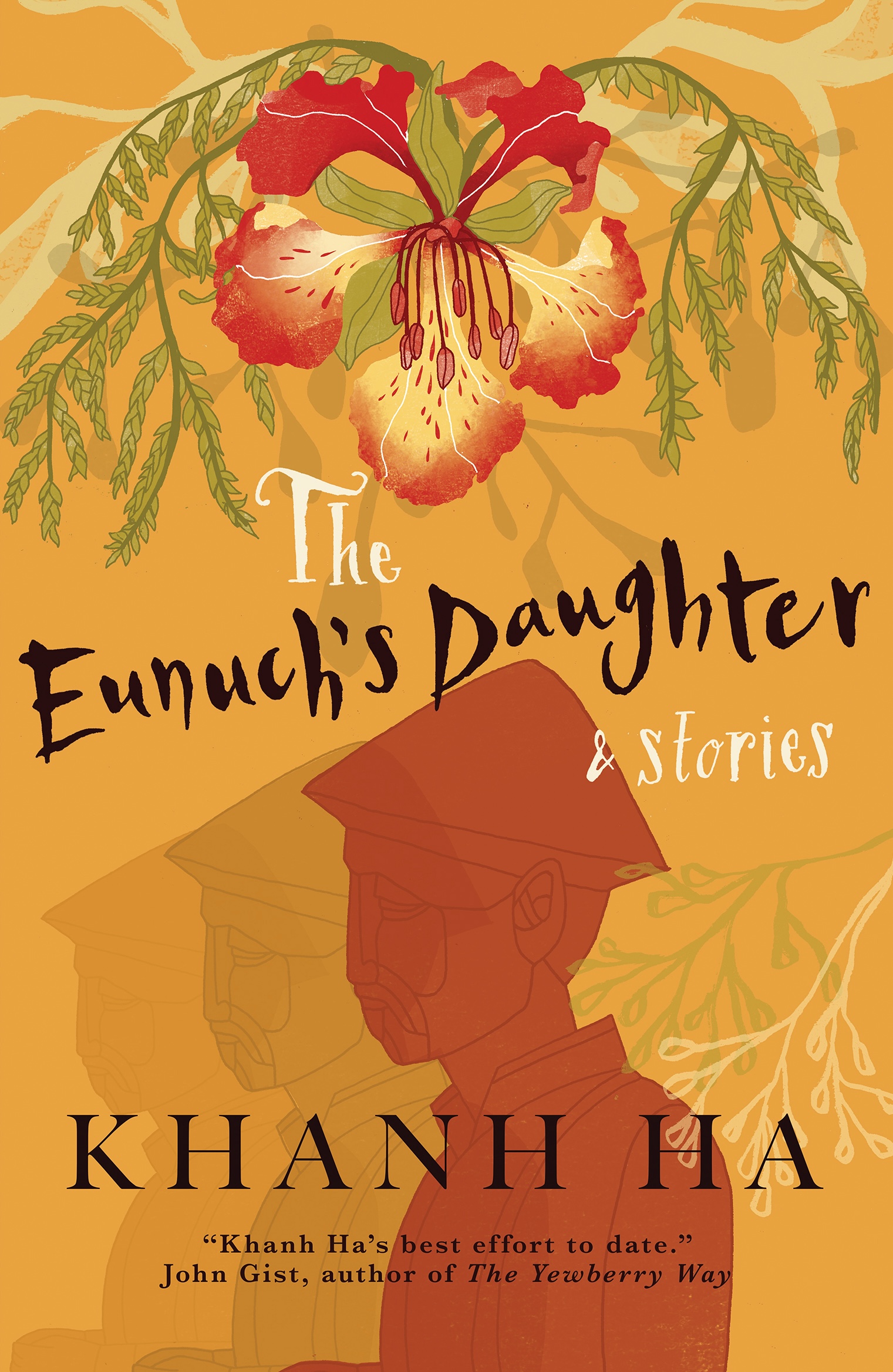
New book alert: The Eunuch’s Daughter & Stories
Today, the 18th February, marks the official publication date of Khanh Ha’s exceptional new book: the short story collection The Eunuch’s Daughter & Stories. John Gist describes it as Ha’s best effort to date, so don’t take our word for it!
Khanh Ha is an award-winning author: a ten-time Pushcart nominee; he is the recipient of the Sand Hills Prize for Best Fiction, the Robert Watson Literary Prize in Fiction, the Orison Anthology Award for Fiction, the James Knudsen Prize for Fiction, the C&R Press Fiction Prize, the EastOver Fiction Prize, the Blackwater Press Fiction Prize, the Gival Press Novel Award, and the Red Hen Press Fiction Award, to name but a few. His new collection takes us through Vietnam past and present, imperial and rural, idyllic and wrecked by war. There is as much charm and beauty in the luscious hair of a concubine as there is in the acrid smells of a fishing village, or in the troubled dynamics of a modern household.
Ha’s writing endows the world he creates with his pen with a grace and elegance that is unique to his style. We are delighted to be presenting The Eunuch’s Daughter & Stories to the world! Head over to our site to get your copy.
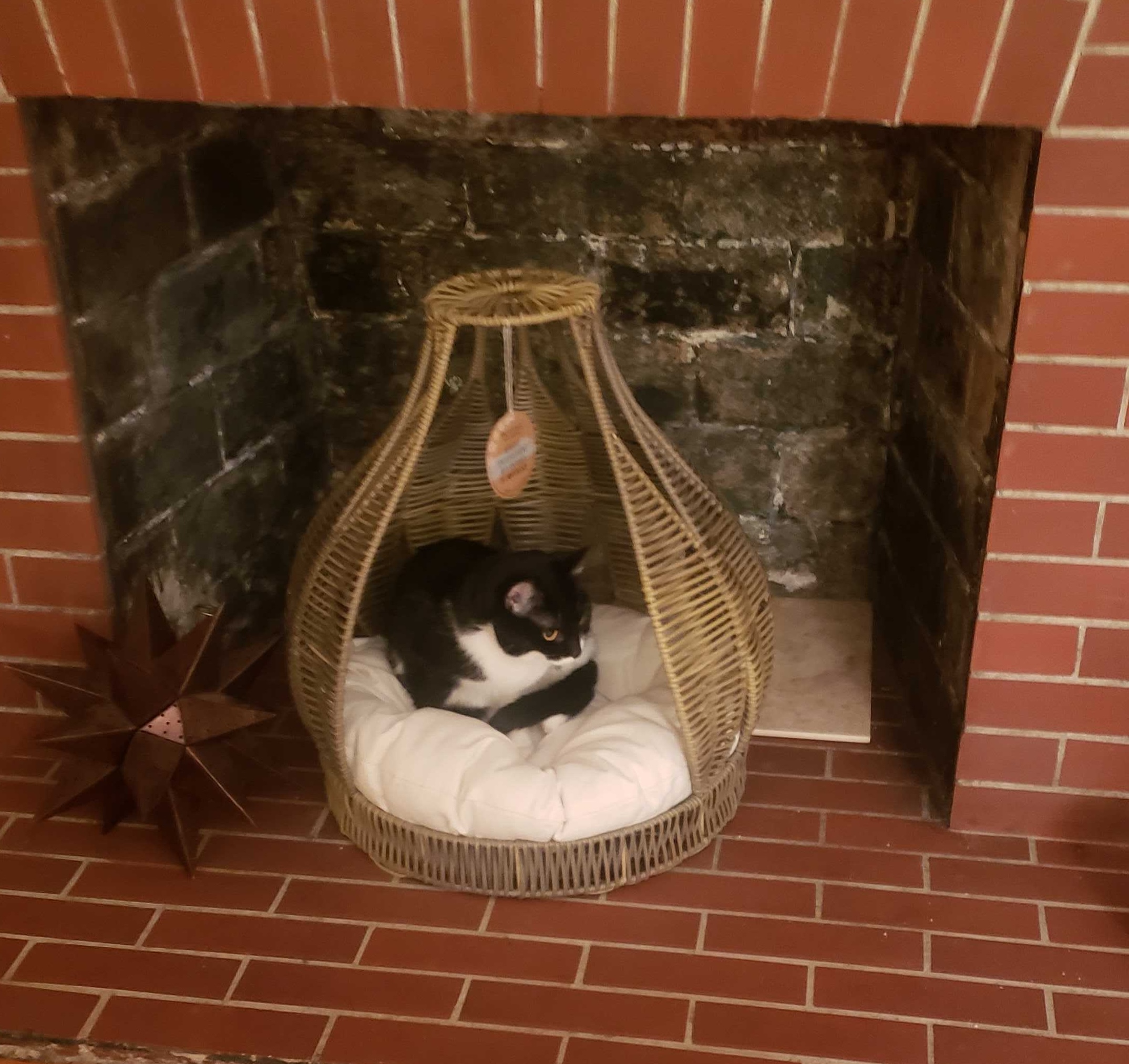
Another chat with Flòraidh MacDonald Ford
Once again, it’s Answer Your Cat’s Questions Day, and once again, Flòraidh MacDonald Ford has agreed to sit down and answer a few of ours. We’re delighted she was able to take time from her busy and hectic schedule to join us.
- Flòraidh, what have you been up to this year?
Thank you for inviting me back! It’s been a busy year. I moved and now have a house with windows on all the sides and trees and a bird feeder. When I’m not on my heated bed I have to check things out from all directions. And there are so many different sunbeams to chase.
- Have you acquired any new favorite things this year?
Well, there’s my heated bed, my scratchy mushroom, my scratchy Christmas tree, the little nest bed mommy made me in the fireplace that I don’t sit in, and the robot with feathers Santa brought me. Plus loads more fancy collars and toys to chase. I have a wee lobster called Floyd.
- Do you have any goals for the new year?
No, not as such. I’ve achieved perfection but those around me could always stand for some improvement.
(Arches back. Rolls and shows tummy.)- Childless cat ladies?
I’m the cat of a childless cat lady and I just don’t see what the issue is. She’s happy with her life choices. She has me and I’m totally indulged. More people like mommy should run things. We’d have all the toys we want and plenty of laptime and belly rubs.
- How has the move changed your daily schedule?
It’s still very busy. I have a lot responsibility and there’s a great deal of pressure on me. But I do get held even more than I did before and now I have my own spot on the desk so I can really supervise what’s happening at Blackwater.
- What’s your favorite thing about your new house?
While the office only has one window and not an interesting one, I like how I can scratch my mushroom without having to leave my heated bed. And sometimes, if I want to bake a part of me that isn’t my tummy, I get under the bed and against the heat duct. And there’s a birdfeeder out front. It’s like cat T.V.!
- Hardbacks, paperbacks, or ebooks?
Paperbacks definitely. I tend to be held while other people read and hardbacks are a challenge if you’re multitasking (should one be multitasking while holding me…? That’s the real question.) and I don’t like being a rest for a hardback. I’m very small and hardbacks are heavy. Same problem with ebooks: I get moved or fussed at if I sit on electronics and I think they require two hands to use and I like to bite when people use their phones near me. And besides, the Ford household is a bit old-fashioned. We like actual paper.
- How has your manuscript selection method developed over the years you’ve been involved with Blackwater? Has anything in your process changed?
No, not really, though sometimes I chew on the paper.
- …because…?
Because I like how it feels.
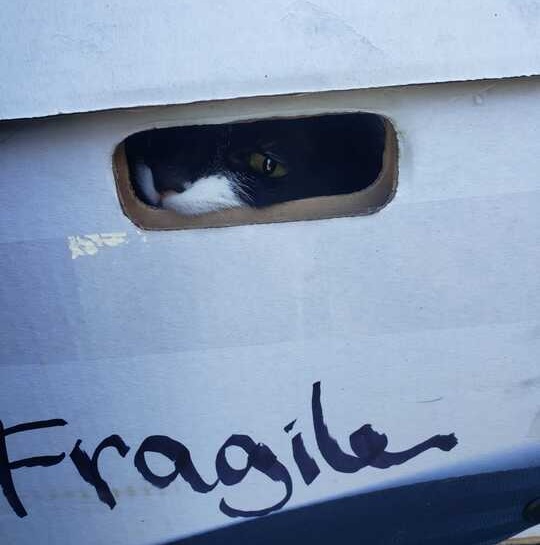
- What have been the high points of the past year?
Moving. I don’t get carsick when we travel anymore. Breaking my carrier and getting to ride in a box. Getting my heated bed. Having mommy home with me a lot more. Oh…and I had my 32st kill…
- How has fame changed your life?
It hasn’t.
- Have you ever knocked a book off a shelf just because you disagreed with the ending?
(Rolls to side, stretches slowly in all directions.)
- What was the name of Alexander the Great’s horse?
(Gives disdainful look.)
Everyone knows it’s Bucephalus.- What do you all day when you’re on your own?
(Rolls over. Shows tummy. Pulls legs up into a shrimp position.)
And sometimes I get out Fish on a Stick and leave him some place new. I howl when I do that.- What advice to you have for Blackwater Press in the coming year?
Cha dig ugh mòr a tòn an dreathain.
- We’ve touched on politics already: do you have any thoughts on today’s major world event you’d like to share?
(Contorts. Slowly licks behind.)
- Quite. Any parting thoughts for this year?
Sometimes I spring in a circle and grab my tail.
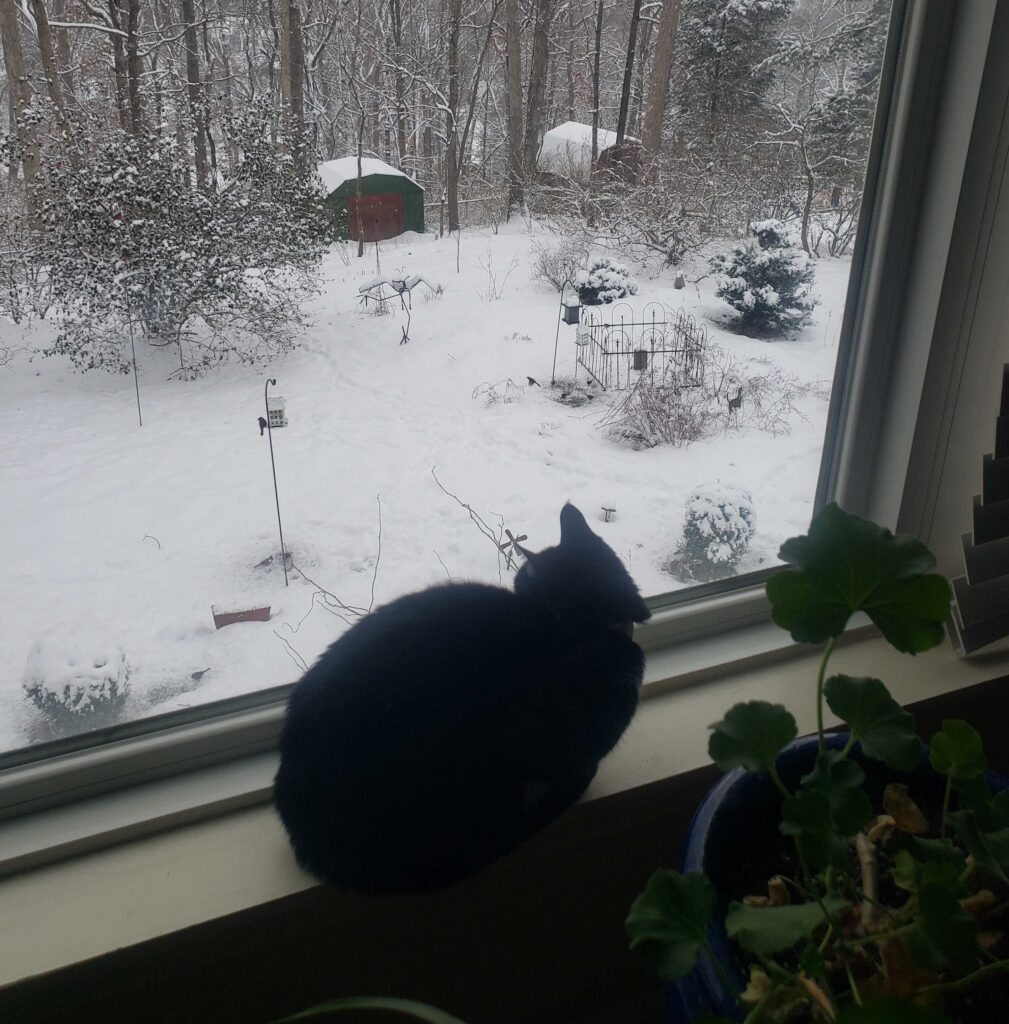
Our 2025 Titles Are Here!
Hello friends,
We’re excited to share the lineup of amazing books we’ll be bringing to you in 2025! From captivating stories and powerful biographies to thought-provoking essays and historical discoveries, these titles are sure to inspire, entertain, and spark curiosity. Here’s what’s coming your way:
The Eunuch’s Daughter & Stories by Khanh Ha
Take a journey through Vietnam’s past and present in this stunning collection of short stories. From imperial courts to modern households, Khanh Ha masterfully explores heartbreak, redemption, and the complexity of human connections. Readers are already calling it “extraordinary” and “beautiful.” You won’t want to miss this one!
Crosshatch: Martha Schofield, the Forgotten Feminist (1839–1916) by Christina Larocco
Ever wondered about the lives of the women who shaped history? Meet Martha Schofield, an abolitionist and feminist who fearlessly fought for equality during one of the most turbulent times in American history. Based on her personal letters and diaries, this beautifully written book brings her inspiring story to life while offering a fresh perspective on our own times.
Soul Friend and Other Love Notes to the Natural World by Sheila McEntee
This collection of heartfelt essays is like a love letter to nature. Sheila McEntee reflects on 20 years of exploring forests, rivers, and her own backyard, finding wisdom, comfort, and joy in the natural world. With stunning pen-and-ink illustrations by Sophie Kromholz, this is the perfect read for anyone who finds solace in the outdoors.
Squid Boy Raven Girl by R. R. Davis
Get ready to dive into the mysterious world of a remote Inuit village on Canada’s Labrador coast. Follow Robert, a preteen grappling with his inner and outer worlds, in a story that’s as haunting as it is beautiful. This novel explores growing up, resilience, and the impacts of colonialism, and it’ll stick with you long after you turn the last page.
The Battle of Cowpens, Reexamined by Robert A. Ford
History buffs, this one’s for you! This fascinating book takes a fresh look at one of the American Revolution’s most pivotal battles, challenging old assumptions and uncovering the brilliance of Daniel Morgan’s strategy. Whether you’re a military history enthusiast or just curious about the past, this is a must-read.
An Absent Life: Elizabeth, the “mad” Duchess of Albemarle, 1654–1734 by Paul Boucher
Delve into the hidden life of Elizabeth Cavendish, Duchess of Albemarle, often dismissed as “the mad duchess.” Paul Boucher meticulously reconstructs her story, revealing a woman shaped by her era’s gender and societal constraints, whose life was overshadowed by misdiagnosis and neglect.
With vivid historical detail, the book explores Elizabeth’s journey through the grandeur of 17th-century English aristocracy, her struggles with mental health, and the complex web of familial and societal pressures. Drawing on rare archival evidence, Boucher paints an intimate portrait of a woman largely forgotten by history.The Maestro and Her Protégé by Kate Whouley
Step into the compelling world of The Maestro and Her Protégé, a richly woven tale of music, mentorship, and personal transformation. This evocative novel follows Hannah Schaeffer, a fictional trailblazing conductor, as she navigates the challenges of breaking barriers in a male-dominated industry. Inspired by her mentor, the iconic Nadia Boulanger (a real-life musical luminary) Hannah’s journey spans decades, intertwining themes of ambition, love, and resilience. Alternating between her formative years as a prodigy in 1960s Paris and her reflective present-day quest for creative renewal, Hannah’s story crescendos with a poignant exploration of identity and legacy. Perfect for lovers of music and literature, Whouley’s narrative resonates like a masterful symphony, capturing the triumphs and tribulations of an extraordinary life dedicated to art.
We can’t wait for you to dive into these incredible books. Keep an eye out for pre-orders and special sneak peeks; there’s so much to look forward to!
Thanks for being part of the Blackwater Press family. Here’s to another year of amazing stories!
Warmly,
Elizabeth, Vivien, and Luca
“Ny Kirree fo Niaghtey” (The Sheep Under the Snow)
Blackwater Press is pleased to announce the release of the audiobook of Mission to Madagascar: The Sergeant, the King and the Slave Trade, read by the author David Mould. You can listen to Chapter 1, “The Good Season for Travel” here and view a short teaser. Then scroll up to edition and select the “audiobook” option.
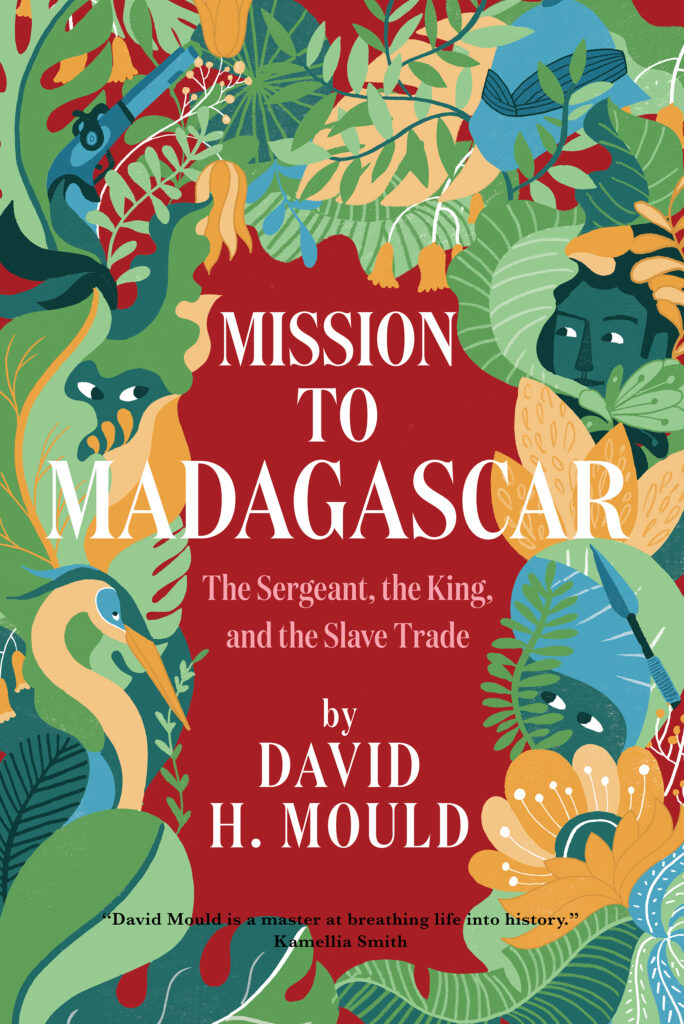
Here, David describes his research for music for the teaser.
What kind of music did James Hastie hear as he was growing up in County Cork? When he joined other army recruits in the assembly hall as they prepared to ship out to India? On the long sea voyage and on his later voyages between Mauritius and Madagascar?
That was the question I faced in selecting music for the teaser to the audiobook of Mission to Madagascar: The Sergeant, the King and the Slave Trade. It had to be historically appropriate—both the tune and the instruments played.
My publisher, Elizabeth Ford, is a scholar of Scottish music in the long eighteenth century, so she shot down several of my ideas before they were even out of the gate. This was the age when “classical” music was being composed but before the idea of classical music was invented, so Hastie’s soundscape would have included tunes from Ireland, England, and Scotland, ballads and tunes from popular operas, assembly dances, and theatre. Music was transmitted via the oral tradition and/or via manuscript book.
With those insights, I went looking for a tune with the right tempo and mood. I found it in the early music collection of Ernst Stolz, a teacher and performer of early music in The Hague. I was drawn to the tune of the ballad “Ny Kirree fo Niaghtey” (The Sheep Under The Snow).The ballad records a tragedy that occurred in the Isle of Man, in the Irish Sea between England and Ireland, probably sometime in the eighteenth century. It was written in Manx, a Celtic language which shares a significant amount of vocabulary and grammar with Irish as both descend from Old Irish.
The words tell of how sheep grazed freely on the grassy hillsides. After a heavy snowfall, shepherds were unable to reach them, and many died, a huge blow to local livelihoods. The ballad reflects the island’s pastoral life and was passed down through oral tradition. Here’s the first and last verses:The snow’s on the mountains, the snow’s in the gill;
My sheep they have wander’d all over the hill;
Uprise then, my shepherds, with haste let us go
Where my sheep are all buried deep under the snow.Then up rose those shepherds; with haste they did go
Where my sheep lay all buried deep under the snow;
They sought them with sorrow; they sought them with dread,
And they found them at last, but the sheep were all dead.Ernst Stolz plays all instruments on “Ny Kirree fo Niaghtey.”
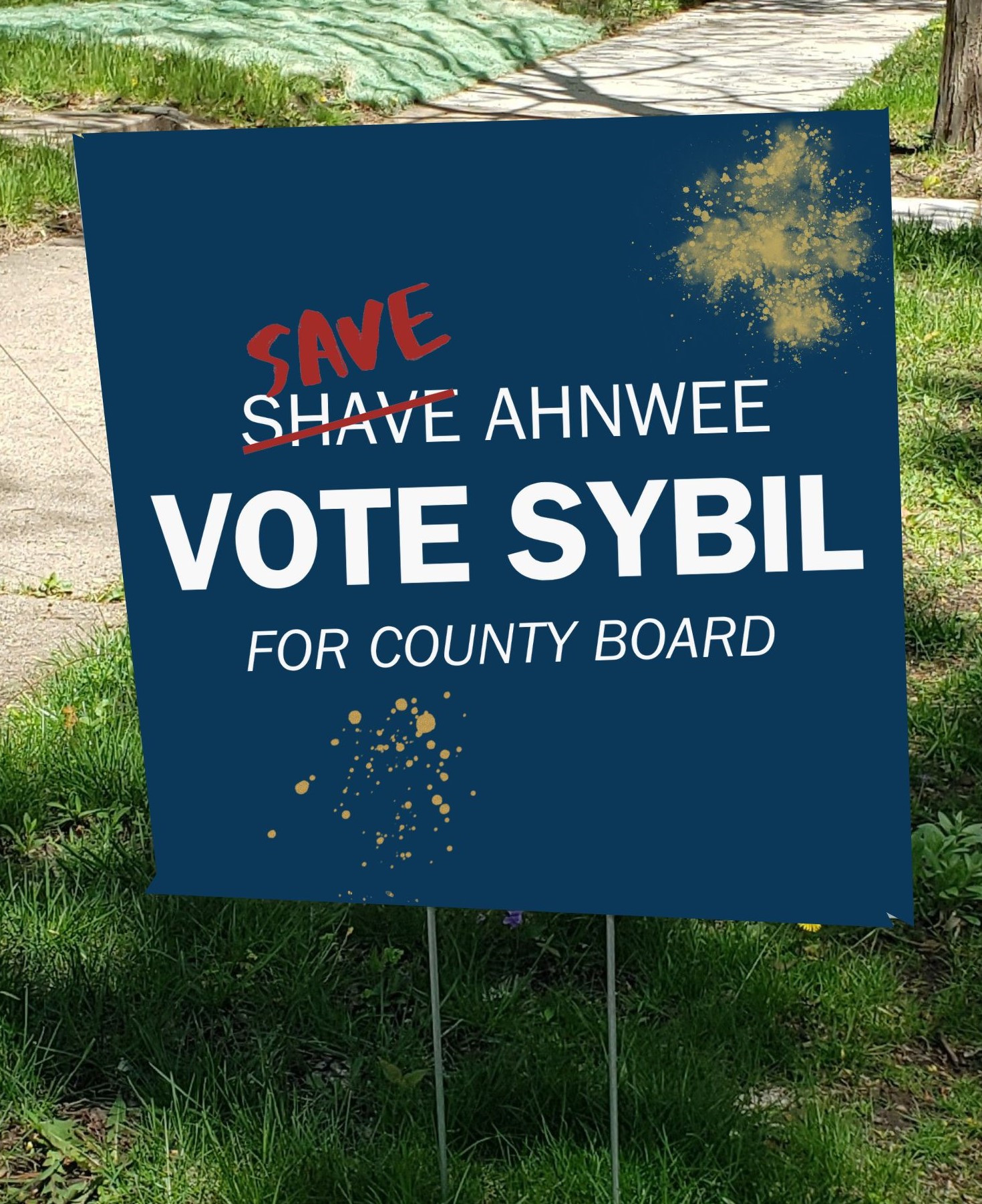
Shave Anwee!
by William E Burleson
My name is Sybil Voss, and I am the fictional mayor of Ahnwee, Minnesota.
I’ve been asked by its author to write a thing about the new book, Ahnwee Days, which tells the story of my small, feisty, and likely doomed town.
I’m not sure how I feel about having my and my town’s struggles chronicled in this way. Is all publicity good publicity? I guess. But an entire novel about our fight to save our town? Even good publicity can be exhausting.
I only want to save my town, and I’ll do whatever is necessary to succeed. I do not want to be a celebrity. Seriously—kind-of un-American, but it’s the truth. I’m just a mayor of a town of 200 people who got the job—so I’m told and told and told—because it was my turn.
Don’t get me wrong: I’m proud to be the mayor of Ahnwee. I grew up here. I know every street and every soul in the town. I like the idea that as mayor I’m giving back, or, at least, trying to give back. I’m not sure people see it, or care, or are at least willing to acknowledge it, but I know I’m trying.
Take our first ever Founders Day, also for some reason called Ahnwee Days in the title of the book. That was a great success. Well, success in that it happened. That counts, right? Not many people came, sure, and not many vendors set up and the ones that did didn’t make any money. But money’s not everything, I suppose. Sure, those stoners at Let’s Go Crazy Printz in Despar wrote “Flounders” on the banner. But you can’t let the perfect be the enemy of the good, right?
But back to the book and my moment of fame. I don’t want it. I did understand that running for county board would provide a certain amount of notoriety. But just a tiny amount. How many of your county board members would you recognize if they were in line with you at the grocery store?
Honestly, I’m not asking for much. All I want is for my father to snap out of whatever feedback loop he’s in that makes him only able to communicate using 1970s TV theme songs. I want my brothers to step up to the plate and help out. I want my friends to be happy. And most of all, I want people to leave my town alone.
You could say that in the book, Ahnwee is just a proxy for jillions of small towns that struggle to not fall into disrepair, irrelevance, and uselessness. Big box retailers drive main streets into ruin. That hardware store that has just the right gizmo for your old faucet? Gone. Need a washer? Go to the Ubermart and buy a new faucet. How about factory farms? We know that small farmers (the farmers aren’t actually small, just their farms) are more likely to buy local, not to mention are often better stewards of the land. Pigs rooting around in a pen—good for the pigs and good for the land. Pigs in giant buildings with manure fields holding as much waste as a small city stinking up the place—not so good.
Small towns are caught in a vicious cycle: Businesses leave and then there’s fewer places to work and less to do. People leave—especially young people—and then there’s even fewer businesses and even less to do. As a result, small towns get emptier and more and more gray.
But those are all bigger problems for someone to solve. I want to talk about Ahnwee. We have our own unique challenges, such as:
- A wind turbine that hits cars off the highway
- A lake that glows in the dark
- A smell of pig poo when the wind is from the south
None of which are exactly good for Yelp reviews, if we ever got one.
Those problems are obvious to anyone who visits our town, should someone ever do that. Less obvious but even more challenging is the town’s twin existential threats (as people like to say these days): The apparent lack of good title search companies in the area and a greedy so-in-so on the country board who’s in the pocket of the wind turbine factory on the freeway.
As a result, it seems like everyone wants to tear down our little town.
Realistically, we may end up chaining ourselves to bulldozers before this is over.
But anyway: about the book. It was OK. I felt a bit insulted at times—no more 30-something, 20 extra pounds shaming!—but it got the facts right. Although, how could it not, since it’s fiction and the author made the whole thing up in his coffee-addled brain. How else can you connect balloon accidents and syphilis outbreaks in the 1800s to mobs attacking towns in the nineteen-teens, to passive aggression today? Takes a warped mind.
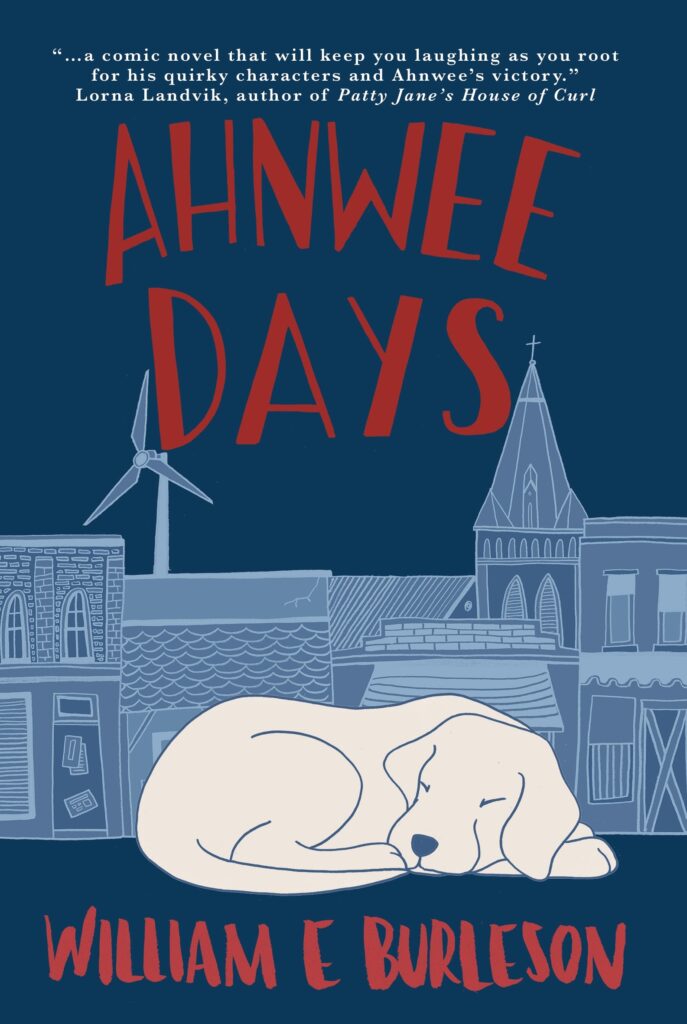
Join Sybils quest for the county board, and Shave Ahnwee! www.shaveahnwee.com
William E Burleson is the Author of Ahnwee Days, coming October 1, 2024.
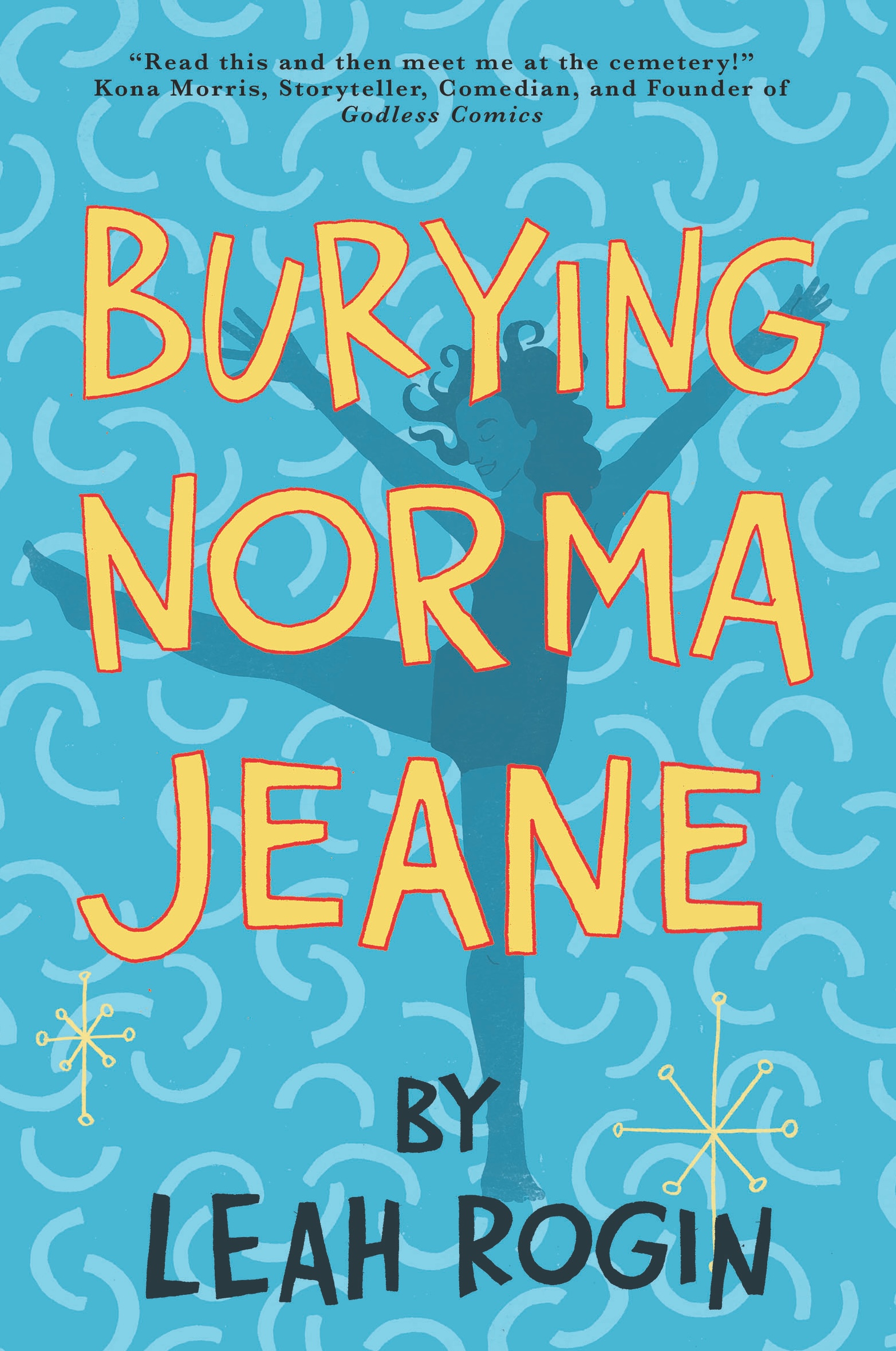
Three Marilyn Monroe Movies Everyone Should Watch
Ahead of publication of Burying Norma Jeane and Sunday’s related events, please enjoy this blog post by author Leah Rogin.
When I started writing my novel, Burying Norma Jeane, it began as a short story response to finding out that Marilyn Monroe was sharing crypt-space with Hugh Hefner for the rest of eternity without ever having given permission.
I measured that 2020-pandemic era in terms of “High Covid” (when we were baking pineapple upside down cakes and wondering how we’d isolate for six whole weeks), “Middle Covid,” (when the weeks turned to years and all that baking caught up with us), and “Low Covid,” (which no one likes to talk about). It was right between Middle Covid and Low Covid when I started watching all the Marilyn movies. I’d only watched a couple before, and I was working on this short story about visiting her crypt, and it was a way to help the days pass. While I was watching them, I’d write these snarky film reviews of each one, as a way to talk back to the chauvinism, the 1950s cheesiness, the way men kept lassoing Marilyn, both literally and metaphorically. Eventually I realized this was all part of the same project, that the short story and the film reviews belonged together, and trying to figure out how to sew them took me through most of Low Covid. As I brought my book into the world, I realized that while almost everyone knows who Marilyn Monroe is, many folks have never seen one of her movies all the way through. I was raised by a cinephile and have always been a classic film fan, so this possibility had not occurred to me! If you’ve never seen a Marilyn Monroe movie, watch one of these three and then tell me about it at leahrogin@gmail.com
- Some Like it Hot (1959) is probably the quintessential Marilyn Monroe movie, and it’s super gender-bendery in ways that hold up surprisingly well. Men posing as women, posing as men are working hard to break down gender binaries before anyone knew that was a thing, and the closing scene is a particularly classic representation of this. It was given the #22 spot on the American Film Institute’s (AFI) Top 100 films celebrating 100 years of Hollywood, and was named the #1 Comedy on AFI’s 100 Funniest American Movies of All Time. Everyone involved in it was nominated for an Academy Award except Marilyn Monroe, who carries the whole freakin movie, which tells you a lot of what you need to know about how she was treated in Hollywood. Watch it with a lover in a sexy nightie; swap pajamas halfway through.
- The Misfits (1961) was Marilyn Monroe’s last released movie (after it was completed she worked on never-finished Something’s Got to Give). She starred in it with her quintessential Daddy figure, Clark Gable, who died 10 days after filming wrapped. It was a rough movie for all involved. An anti-western that uses the backdrop of the evaporating cowboy lifestyle, it was written by Pulitzer Prize-winning fink, Arthur Miller. Marilyn’s third husband, and author of prestigious plays like Death of a Salesman, Miller probably didn’t marry Marilyn just to break into Hollywood? And he definitely didn’t write this whole movie just to torture the wife who was about to leave him? Whatever the case, Marilyn definitely should have won an Academy Award for this one. and probably a “not murdering her superfink of a husband” award if such things were being passed out. Watch it in a cowboy hat and invite some friends.
- Gentleman Prefer Blondes (1953) is my personal favorite Marilyn Monroe musical. I grew up watching it as a kid and must have seen it 20-30 times. I was surprised when I got to graduate school and read the 1925 novel by Anita Loos in my feminist literature class, and maybe that whole juxtaposition is what started my journey of taking Marilyn more seriously. Whether or not you want to see it through a post-feminist lens, Jane Russell and Marilyn have hilarious chemistry, “Diamonds are a Girl’s Best Friend,” is the single best musical number ever (fight me!) that you probably don’t realize you’ve seen spoofed / homaged everywhere from Madonna to Moulin Rouge to Beyonce. Watch it with a swanky cocktail party and lots of glamorous costume changes.
Bonus Watches if you’re feeling Noir-y: Don’t Bother to Knock (1952) and Niagara (1953) I could keep gushing about Marilyn Monroe movies, and if you’ve never seen one, I encourage you to make a night of it. I think both Don’t Bother to Knock, and maybe especially Niagara are the best noir films of the 1950s, and they show a dark side to her acting talents that you won’t see in the films above.
You can also pick up Burying Norma Jeane and read my version of Marilyn’s biography in the form of movies, while also cheering for Matilda and Miriam to liberate her body from Hugh Hefner’s stanky clutches. And if you’re in the L.A. area on August 4th, Marilyn’s Death-versary, come see another kind of film at the Hollywood Library: Deanne Stillman’s “Marilyn Monroe Flees her Grave When Hugh Hefner is Buried Next Door” and hear me read from and sign copies of Burying Norma Jeane. You might even win a Marilyn Monroe trading card or other swag from Blackwater Press and the Library.
And extra bonus video.
@wheresnormajeane Unboxing copies of Burying Norma Jeane my first novel by @Blackwater Press #marilynmonroe #booktok #normajean #hollywoodforevercemetery #normajeane #normajeanemortenson #normajeanebaker
♬ I Wanna Be Loved by You – Remastered – Marilyn MonroeThe author unboxing her copies 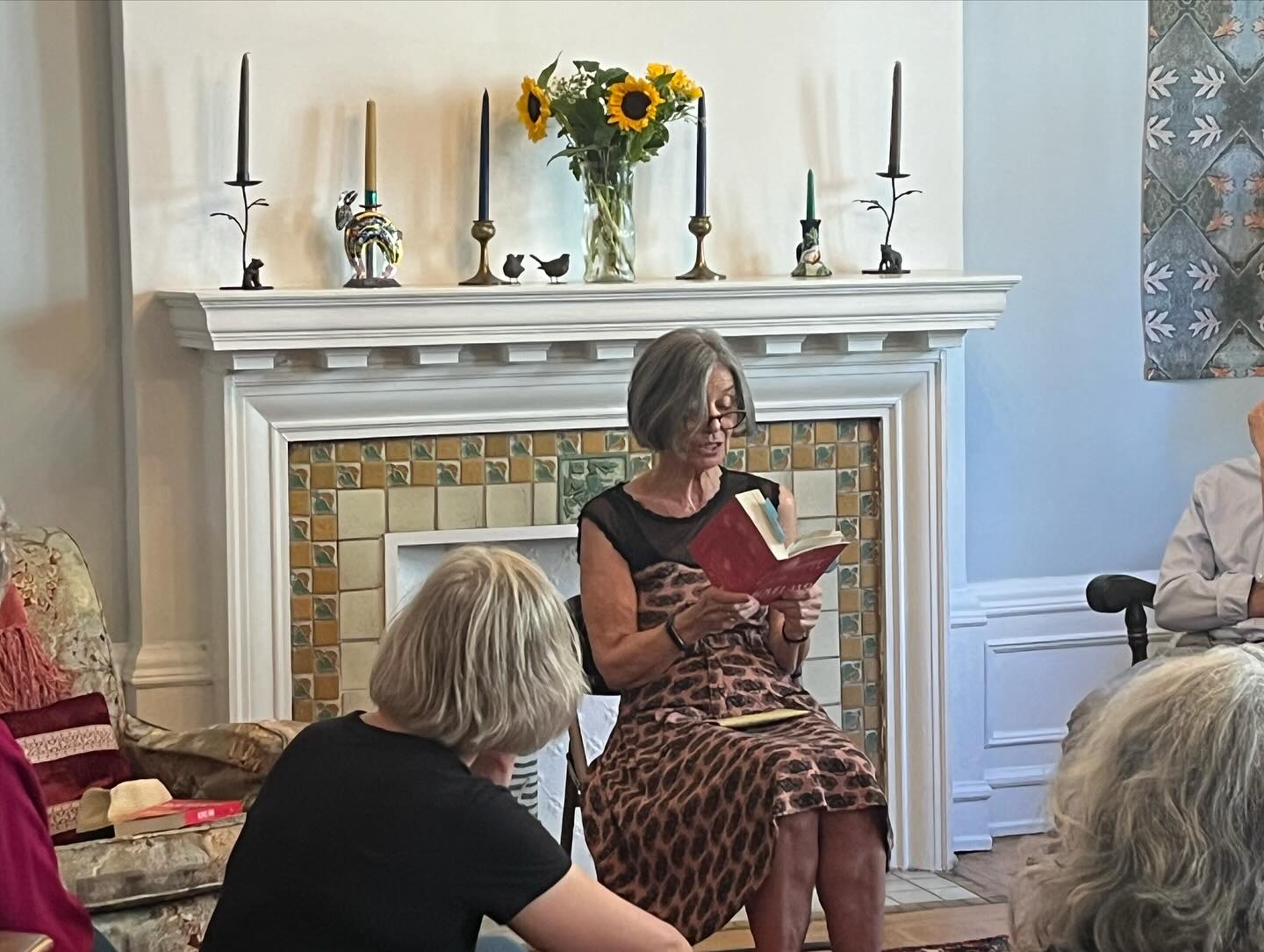
My Best Relationship Advice
Susan Ostrov’s Loveland: A Memoir of Romance and Fiction was released July 15.
I should start off by saying I’m probably the last person you’d want to give you or anyone relationship advice! I had almost no romantic experience when I got married in college, I was divorced after 24 years of marriage, and haven’t lived with anyone since. By the usual measures, which includes marching into the future till death do you part, that makes me a total failure at romantic relationships.
Was it a failure, though? I not only had some of the best times in my life with all the romances I’ve had (I don’t mean casual dating, which has been something of a disaster), I’ve learned from each of them — both learned what I really like (and don’t), and also how to understand what’s happening while it happens. So, I’m thinking here of general “advice,” rather than dissecting the specific relationships I’ve had.
Being honest, but not too honest, looking back, I see how difficult it was for me to express my thoughts when I wasn’t sure how they’d be received. Often, my fear of rejection and losing what I had kept me from asking for more, when what I had wasn’t enough. So, I settled, and told myself that relationships aren’t ideal, that no one is perfect, and so on. Which is true. But at some point, you have to know what you shouldn’t put up with, even if you can put up with it by turning your head away. Relationships are embodied habits: once you both get into a familiar groove of giving and taking, this much and not more or less, it gets harder and harder to change that equation.
I had a therapist once who was just so-so as a therapist, but had a moment with me that I still recall. It started with my complaining, as usual, about a certain gentleman. This gentleman had, as he so often had, casually answered a question with an evasive and a possibly ironic tone that seemed hurtful to me (I honestly no longer remember what the question was). What I was dwelling on was my sense of being wounded, going over and over the conversation to see if I could read what this person meant by his response. Of course, I was hoping the therapist would read his words, read him, for me. But after some tedious minutes of this (poor lady), she leaned forward and said, “Let’s talk about why you didn’t ask him on the spot, ‘What did that tone mean?’, when he said it.” This shift in perspective was amazing: it forced me to ask myself why I was afraid to question him, which is a kind of demand for the truth. Another way to put this: I saw you have to stand up for yourself or you’ll get mowed down. And if you can’t risk it, you’ve already been mowed down to grass-level anyway. So, risk it!
Now here’s what makes it tricky: There’s a thin line between “standing up for yourself” and being so sensitive to slights and injuries that you’re in a constant, pointless battle with the other for the preservation of your egos. When are you justifiably protecting yourself and when are you merely trying to control the other person? I saw this played out, unfortunately, with my own parents for all the years I lived with them.
Amusingly, I’ve watched reality dating/marriage shows on TV where it’s easy to see this kind of interaction all the time. A is hurt by something B did or said, B apologizes, A is still pissed off and keeps launching offensive attacks against B in the name of “being honest about my feelings,” which causes B to get defensive, whereupon A accuses B of “getting defensive” (duh). That’s not “honesty”, that’s spilling aggression, sometimes without being aware that your hostility is more obvious than you think.
Here’s what I’ve learned: Be honest, both to yourself and to the Other, but be curious also. Be curious about why someone behaved this way or that, what expectations they have that are different from your own, what they might want that’s different than you want, and how you can both get something out of it, even if one can’t win. “What were you thinking?” and “Why do you do that?” (or “say that”), can be aggressive questions, or compassionate questions. The intent (and tone) is everything. The former implies “You’re an idiot or a bad person,” the latter says “I want to understand you because you’re worth it.”
I was very young and inexperienced when I married, and so was my husband. When disagreements came up, sometimes big ones, I had no idea how to talk about them – I mean I literally had no vocabulary to use in talking it out or figuring out what to do. So, I would cry, and he would apologize or bluster, and then, uncomfortable with the anger, we’d pretend to go on as if it were all back to normal. And we never got much better at it once this pattern was established. Adding children to the mix just reinforced the pattern, since the stakes were higher: there’s more incentive to stay together, but that can work for or against you.
One more lesson from reality TV: it’s fascinating to see how often couples interrupt each other while arguing. Sometimes neither completes an actual sentence, or one babbles while the other lapses into complete unresponsiveness. Neither listens to the other, unless it’s to listen for a trigger that tells them to bring out their own six-shooters. If I were in an argument with a boyfriend or husband again, I’d ask for each of us to talk (for a reasonable length of time) until each has said what they want before the other person does the same. No interrupting, no exclamations; just LISTEN, damn it, and learn. And be curious about what you hear before you rush to contradict it, or say why the other is wrong, or make your own case. Ask: what were you hoping for, what was such-and-such like for you?
Of course, having said all that, it helps enormously if the Significant Other is capable of doing the same. Now in my old age, if I were wounded by someone’s words or tone, I would ask, as that therapist once advised me to: “What did you mean by that?” Or at least I hope I would.
Susan Ostrov

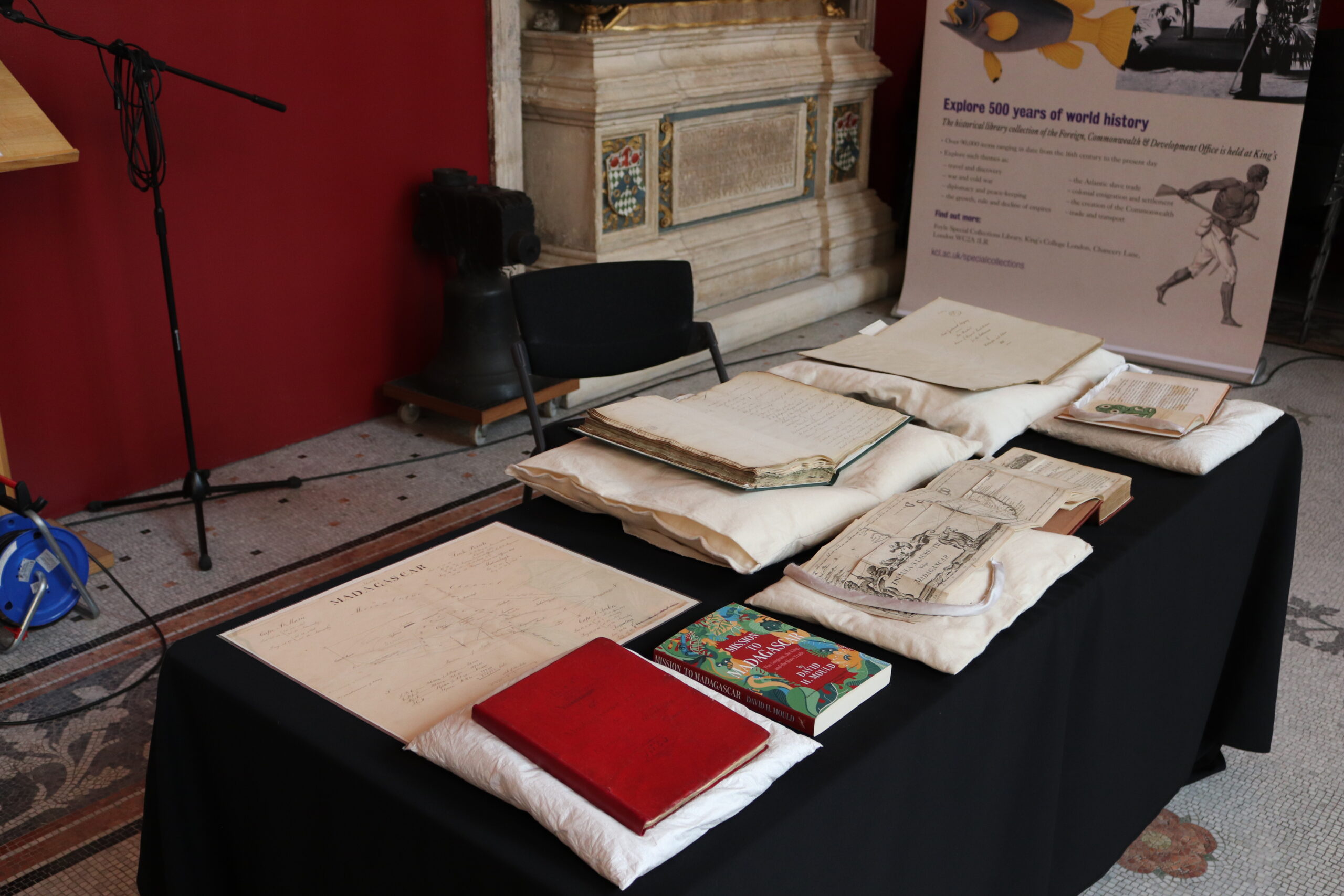
James Hastie diary discovered in New Zealand
by David Mould
In November 2023, John Parker and his wife Paulette, who own a cattle ranch in New Zealand’s North Island, were sorting through the possessions of John’s father, Tony, who had recently passed away. Among them was a precious historical resource—an 1817 diary by James Hastie.
My 2023 Blackwater Press book, Mission to Madagascar: The Sergeant, the King, and the Slave Trade, describes how Hastie, a 30-year-old East India Company sergeant with no diplomatic training, brokered a treaty with Radama, the most powerful clan chief in Madagascar, to end the export of slaves to the plantations of Mauritius, the British island colony seized from the French during the Napoleonic Wars.
Hastie became the British envoy to Madagascar and Radama’s trusted advisor, arranging for the supply of British munitions and joining Radama on campaigns to subdue rival clans. He brought in artisans to teach trades, negotiated for the London Missionary Society to open schools, and supported Radama in his power struggle against traditionalist factions. Sir Mervyn Brown, a former UK ambassador and historian of Madagascar, described Hastie as “one of the most important and attractive figures in the history of Anglo-Malagasy relations.”
For more than a century, Hastie’s diaries, written between 1817 and 1826, have been regarded by historians as the most comprehensive and insightful early nineteenth-century traveler’s account of the island’s clans, economy and culture.
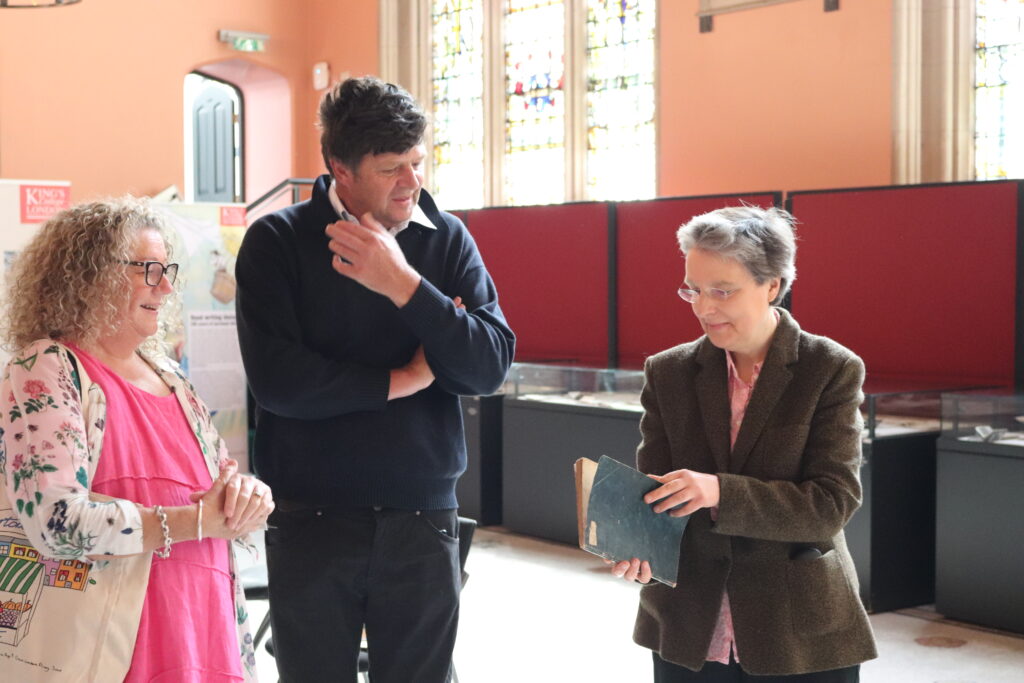
Paulette and John Parker with Katie Sambrook, Head of KCL Special Collections (holding diary) The Parkers know they had found a valuable resource and learned that I had written Hastie’s biography. On November 29, John emailed me. He explained that the diary had been passed down to a Hastie descendant, his grandfather, P.H. Parker, who had emigrated from Britain to New Zealand after World War One. He had also brought with him an oil painting of Hastie and a child’s white smock top and redcoat’s uniform some children’s clothes, reportedly worn by Hastie’s son. John’s cousin had earlier donated the clothing to a museum in Madagascar’s capital, Antananarivo.
“Our issue [concerning the diary],” John wrote, “is what we should do with it and having seen you have recently written a book on the subject—you may be a good place to start.”
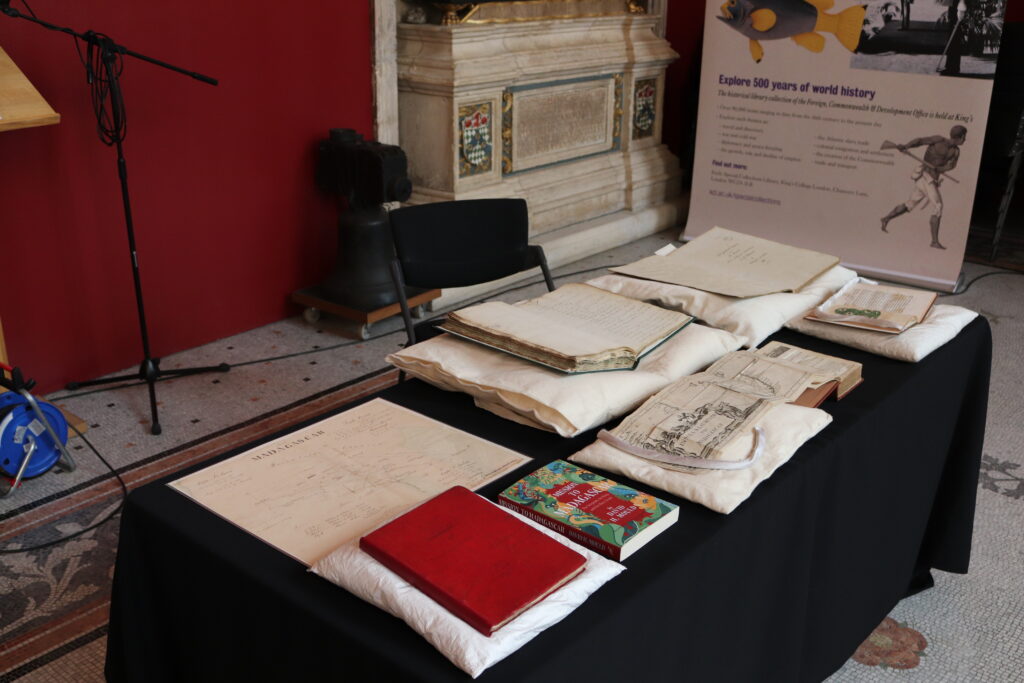
Display of Foyle Collections Madagascar archival materials and Mission to Madagascar Within 24 hours, I was on a Zoom call with John, Paulette and John’s sister Diana. They showed me the diary, which covers the period from September 23 to October 22, 1817, when Hastie was navigating the politics of the Ovah court and building the personal relationship with Radama that led to the signing of the treaty banning the slave trade. The only known copy of Hastie’s diary for this crucial month went missing from the UK National Archives several years ago, leaving historians (me included) to rely on a 1903 French translation by the Academie Malgache.
I was, to put it mildly, thrilled. I advised the Parkers to deposit it at the King’s College London (KCL) Library, where the Foyle Special Collections already include an 1820 Hastie diary and the July 1817 diary of Thomas Locke Lewis, a naval lieutenant who arrived in Madagascar on the same ship as Hastie and conducted a reconnaissance mission before Hastie set out for the Ovah court in the central highlands. I had used both sources in my research, had a good working relationship with the Foyle archivist, Adam Ray, and had done the UK book launch at the library in June 2023.
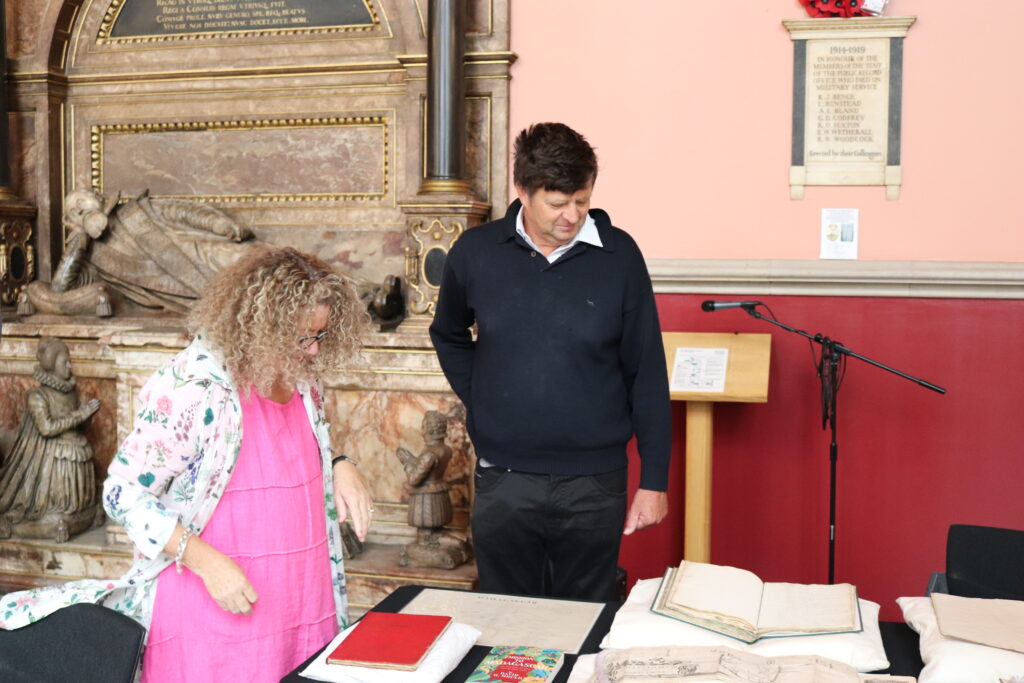
Paulette and John Parker with Foyle Collections Madagascar archival materials The Parkers contacted the KCL Library and agreed to donate the diary, but said they wanted to do so in person. They did so in May 2024 at a special event held in the library’s historic Weston Room which included a display of the 1820 Hastie and 1817 Lewis diaries and other Madagascar artefacts from the Foyle Collections. KCL plans to digitize the 1817 diary so it will be available to all researchers.


Editorial note: what follows concludes the story of James, and his life following his departure from Ireland in 1923.
While Dragging Our Hearts Behind Us
EPILOGUE
By Boni Thompson
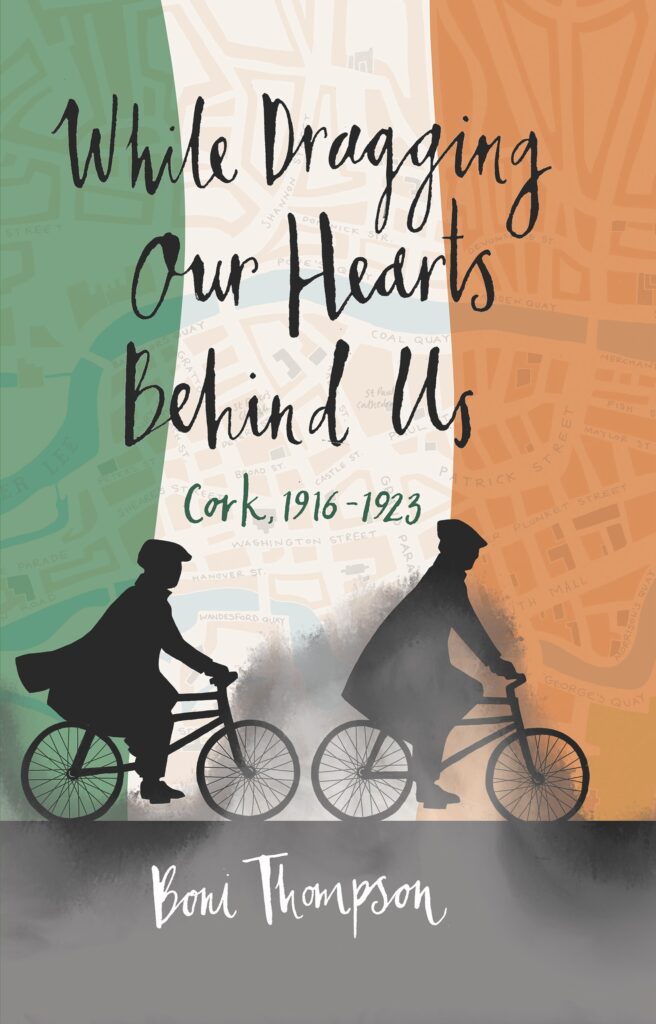
1923
James reaches New York City, by way of the secret branch of the Irish organization Clan na Gael, off-shoot of the Fenians and the Irish Republican Brotherhood, formed decades before to give aid to the many Irish immigrants arriving in America and Canada. He finds the older brother of his friend Sean, Peter MacSwiney, and though he is an illegal alien he works for a time with him. James’ adventures in America are a whole other story, filled with unlikely escapades, and wild characters. These stories will begin with James working for King Solomon, the Jewish gangster gunned down by the psychopath Lucky Luciano in a Boston restaurant, and end in upscale Manhattan, working for George Putnam and his wife, Amelia Earhart, at the exclusive Heigh Ho Club and later. He will make friends with Rudy Vallee, the famous crooner and a whole coterie of movers and shakers that frequented that swinging place in the carefree days before the Great Depression.
Before any of this gets rolling, one Sunday morning in 1924, sitting with a cup of tea, he reads a three-week-old copy of the Cork Examiner, his usual Sunday routine in those early years in America. He is surprised to find a ‘Most Wanted’ notice by the authorities (not the RIC or the Black and Tans, but the new National Guards) of Cork. The men listed? Most all of his former crew from C company, Mick Murphy, Sandow, Donovan, the Grey brothers, and on. Old friends and comrades. They are wanted for a drive by shooting at the still very British docks, in Cobh. (The main harbours of the country still belong to the British as part of the treaty.) It was here a young innocent 18-year-old British soldier was killed and more than 20 people wounded in a drive-by shooting. The paper describes this act as random and wanton. But James knows better. Whoever they were after, it was someone who was getting his comeuppance for whatever nasty deeds he was responsible for in the days of the War. James decides they must have missed their target. James’ friends, those who fought with him, those who believed that freedom could be taken, those who took the risks, did the necessary deeds to ensure that freedom, are described by the new president of Ireland, Cosgrave, as ‘dastardly.’ A L10,000 reward is put on their heads. It is barely a year since the end of the civil war, but already the anti-treaty men of Cork are excluded from any recognition of their courage or indeed devastating sacrifices that brought victory. His friends are on the run once again. Within weeks, every one of them will land in New York City, work the speakeasies and pine for home, where they will all return in a matter of months.
In 2006, the famous Rolls Royce Silver Ghost that they used for this deed, ‘The Moon Car’ so named for its bright yellow hue, will be found partially burned in an excavated dump on a lonely country property. All of Cork will get a taste of what those men must have felt like in that car, when the owner has the car restored to its original magnificence and goes on the road to show it off. Can they imagine the crew of men that ran full speed past the British with Lewis machine guns blazing? Highly unlikely. In 2020, the car will be donated to the National Museum of Ireland
When Frank Busteed shows up in New York City, James finds a kindred spirit. Frank is haunted, though he tries not to show it, enjoying life with a new wife and a new baby, and weekends with all of the Irish at Rockaway Beach, ‘The Irish Riviera’ according to New Yorkers. Pictures of the men together with their families and friends, Irish all, will show up on the internet, almost a hundred years later. James himself is sure not to be caught on camera. Frank, with welts under his eyes, sits on the sand holding the children. He wears a sad, troubled, expression. It is an expression that will reach out from most every photograph to be found of him as years go by.
1936
By 1936, James has spent over 12 years in New York city. He is married to a lovely Irish woman and has three young children. He has spent the last few years working for George Putnam, husband of Amelia Earhart. At first, he worked as doorman at the posh Heigh Ho Club in downtown Manhattan. The club co-owned by Putnam, lasted for a few years as the go-to club of the prohibition era for the upper echelons of Manhattan society. James knows just who to let through the doors and pay the exorbitant 15$ per head entrance fee. He develops a reputation as the no nonsense guardian of the establishment – not someone to be toyed with. 35 East 53rd street with its exotic paintings and art nouveau décor is the happening place for flapper girls, and movers and shakers alike. When the club shuts its doors during the depression, James continues to work for Putnam. As Amelia prepares for her around the world flight and the couple moves to California, James is offered a position. But the depression is over, the gangster’s day is done, America favors law abiding citizens. James must acquire legal status in order to become an American.
His wife is excited about a move to California. Though he has a young family in tow, he will travel home to get his papers. Papers that will allow him to emigrate legally as his wife had. He needn’t have bothered. No papers will be given. Indeed, it will take him eight years to overcome some unknown, latent enemy, undoubtedly a pro-treaty foe, in the great bureaucracy that oversees pensions for the warriors of the War of Independence. He will have to fight for the category of Officer of Cork No 1 Brigade, writing letter after letter, filling out form after form. Letters will be written on his behalf by Tom Crofts, by Florrie O’Donoghue, by Members of the Dail. Florrie himself, now a well-known historian and supporter of all things IRA, will claim, on his behalf, that the work undertaken by the few men of the Intelligence Squad, was the most dangerous work of all, and without those men, things could have turned out much differently.
James looks for work but will never find it in Cork. A return to New York, a move to California becomes an impossible dream. With Amelia’s disappearance in the midst of what is to be her daring flight around the world, in July of 1937, James knows his job prospects with Putnam have been lost with her. His young family, his beautiful wife, now pregnant, is distraught at living in his parent’s tiny home, without an income, their savings running dry. She makes a decision, dresses her children in their best New York attire and takes the train to the far-off countryside of her large family, full of brothers, farmers all. In Cork city, news of James’ return has spread. Old stories are resurrected in the pubs. He is known as a Republican, one of the crew that fought to the bitter end. There are no job offers. There are no jobs. Ireland has been in a slump since the initial blush of Free State government took over. Times are tough. Now he is looking for a job to support himself and his family, and any thought of a return to America has been buried under the harsh reality that is the new Ireland. He makes contact with O`Hegarty, who is grateful to have his job still at the Cork Workhouse. The name of this establishment, last resort of the poor, has changed with the departure of the British, but O`Hegarty is still the scrupulously honest manager who doles out supplies.
The two men observe each other. Well, says O`Hegarty, at least you`re not behind bars. Aye, says James. At least you are on the outside of the poor house looking in. O’Hegarty long ago used up the last of his favors. He is an aging man now, his contribution to the War of Independence forgotten by most. In fact, most want to forget the whole sordid mess. He will bury the love of his life, Magdalen, in 1940, live for twenty years without her and finally in 1963 be buried in a small graveyard beside her in Cork City. School children learn only about Tomas MacCurtain and Terence MacSwiney, both gone from the earth before the fighting really began. The Free State is happy to provide Irish language lessons to the new generations and quietly let the story of the bitter, cruel, often desperate fight that was the Irish War of Independence, slide into oblivion.
Sean is smoking a cigarette, leaning on the old stone wall near his family home as James approaches. His round wire spectacles sit atop his nose as ever they did. He wears a regular laborer’s clothing. His sleeves are rolled up, his thin suspenders hold up worn trousers, he wears thick leather boots, something like the Tans used to wear as they tore around the city. A beautiful young girl is standing beside him, chatting. She is lovely. For a moment James thinks it is Muriel, the most beautiful woman in the world. But of course, she is only about 18 years old, and Muriel was at least his age. Sean watches James approach and he smiles at his old friend. I told you to make a new life Jimmy. What the hell are you doing here? I don`t know Sean. It was good while it lasted, things are bad in the States now. Not as bad as they are here Jimmy. They will never be this bad. James grunts. He has realized this lately. You never came out. You said you would. I have my sisters here Jimmy. I couldn’t just desert them. And this is Mhaire, Terence’s daughter. She has been with us since Muriel decided to stay put in Paris. James nods at the beautiful girl. The resemblance to Muriel is uncanny.
Indeed, Mhaire escaped her depressed mother’s grasp with the help of Mary MacSwiney and the clause in Terrence’s will leaving joint custody to both wife and sister. Mary rescued her from a boarding school in Germany when she discovered her mother rarely visited the child. Mary brought her home to Ireland to the delight of the whole family. However, Muriel herself, the most beautiful woman in the world, will never forgive her own daughter’s complicity in the subterfuge and will refuse to speak to her for the rest of her days. She will live in Paris and London, a well-known member of the Communists and avant-garde artists of both cities. Terrence’s daughter, Mhaire will one day marry Ruairi, the son of the last person he wrote to, Cathal Brugha, and she will live a happy life. Her granddaughter will help her write her memoirs just before she dies at age 90. But at the minute, in Cork City in 1937, James and friend of his youth, Sean, stare at each other intently. So much has changed. And yet, everything is the same. Sean stoops to cough and hack violently. Smoker’s cough. He looks at James and memories of sitting in the Union Quay Barracks, the sweet taste of victory fresh on their breath, saturate James’ mind. Candles in the dark, dreaming of glory soon to descend on them. But James gives his head a shake. Of all people, Sean knows it was hell descended on them instead. To tell you the truth Jimmy, I just ran out of money. I wanted to come. My sisters have the school. They are getting by. But I couldn’t beg, borrow or steal the ship’s passage. It has been rough here since you left. Aye, Sean, I see that. ‘Twasn’t what we thought it would be. No indeed, Jimmy, the locals are apt to say we were better off under the British.
1938
James is desperate for work. His young family has remained at his wife’s family’s country home, there to live by way of the goodness of her brothers and sisters. It seems there is not a single job of any sort for a known Irregular of Cork. James goes to England and looks up his old IRA connections. At the age of 40 he gets a job as a bicycle courier in a small city in the centre of the country. For two horrible years, he lives in a rooming house and sends home what money he can.
1941
War ravages Europe. James hears the Americans are building bases in Ireland. He is first in line for a job and his quartermaster skills of long ago serve him well. He will work there for the length of the war, living at the base, coming home on the odd weekend to his growing family. They hardly know him.
1948
James is 50 years old. The Americans have packed up and left town. He is left to pound the pavement looking for a job. His wife works long hours by the fire, in the evenings, embroidering clothes and housewares for cash. Her former life, dancing in midtown Manhattan, having drinks with Amelia Earhart, that life has receded so far away, she wonders if it was all just a dream. James travels to Dublin where the men who once stoked the people into rebellion, now rule the world. He is politely turned down for any and all government jobs. As he is walking down the street wondering what on earth is to become of him and his family, he runs into a long-forgotten comrade from Cork. A man of much lesser rank in those far off days, but one who prospered under the Free State from the start. He recognizes James, once an Officer, an insider, a man with a hand in every shake down and take down and every episode of subterfuge against the British that he could think of. This man wonders aloud how the fearless, the risk takers, the leaders, the shining rays of hope to the young, how one such as this could have fallen so low. What is wrong with this country? he says to James. James shrugs. We are long forgotten is all. Long forgotten. Quietly now Sir, please follow me. And without a word to his contemporaries, he hires James to work in his department, in a pleasant office, pushing paper. For the next 25 years, James will work for the administration, grateful for the kindness shown him by one he could barely recall. At age 75 he will quietly retire.
1975
‘The Troubles’ ravage Ireland. The North is in upheaval, Catholic vs Protestant, Nationalists vs Ulster Unionists. British soldiers tear about Belfast and Londonderry and the major towns looking out for IRA. IRA tear about Belfast and Londonderry and the major towns looking out for British soldiers. The Ulster Defence Force, a civilian organization dedicated to obliterating the IRA joins the fray. James sits in his modest Dublin home and watches the carnage, the fires, the arrests, the kidnappings, the graffiti, the protests, on the evening news, day after day, year after year. He is 77 years old. His grown children come by to visit, grandchildren in tow. James sits in his comfortable three-piece suit, fancy socks emerging from his hiked-up trousers, and sips his evening shot of whiskey. His hair is long and white, carefully combed to cover the bullet wound in the back of his head. The bullet wound that none of his children, if they know about it, discuss, and none of his grandchildren know exists. They find their grandfather always welcoming, always polite, but stoic, and sometimes sad. They listen in surprise to his occasional outbursts while watching the news. ‘They should have let us just finish it. The eejits. Sure, Collins was on his way to fix it. It could have been done.’ But his grandchildren just shrug and go off to the kitchen, there to sip tea with their grandmother and dip their chocolate biscuits. After all, the North is far away, a different country altogether.
1990
James lies back and as the pain killers kick in, he does a mental survey. His children are fine. They have had a good run. Yes, his own family is safe. Unlike so many families he has been thinking of on and off lately. Families from before New York, from his childhood, his youth in Cork City. It is a miracle that I have survived my own life, he thinks to himself. All those years of madness. All those years living on the edge of disaster before New York and after. He looks at Ashe, but sure, there were a few good times, despite it all and a few adventures Ashe, that be the truth. Yes, we did it alright. We routed the enemy, though a heavy price we paid. All the boys who danced at the end of their ropes, all the boys who suffered. Like you Ashe. Like you. A heavy price indeed.
A nurse walks into the hospital room and checks his IV drip. James looks at her and thinks to himself, I know her. I know this girl. Her eyes are wide and luminous and intelligent, her smile sad. And then it comes to him, the most beautiful woman in the world – Terry’s wife.
Terry, how I worshipped him. And Tomas. One cannot think of one without the other. Two rebels, smart and fearless and bold, both with hearts of gold. And Sean. We knew each other’s secrets, so we did. He has been thinking of Sean this last while. Sean, who like him, was boycotted for years despite being the young brother of the famous Mayor. James didn’t even know until after he passed, dead of emphysema at 46 years old, and was quietly buried, his niece, Terry’s daughter, traumatized, but everyone else in the world happy to forget another anti-treaty IRA and let them and their story fade away into oblivion.
How old am I now, he thinks to himself? 92? No. 91. I will be 92 in a couple of weeks. I will not be here to celebrate! James chuckles to himself. He is looking forward to meeting up with his beautiful wife. He thinks of her in her shimmering flapper dress and matching cloche hat, dancing up a storm at the Heigh Ho. Wait for me, he calls out. I will be with you soon.
The old tinker woman was wrong. I will not make 92. He lays back and his mind wanders. Then suddenly he begins to laugh. I am in my 92nd year so I am. Why the old girl was right after all. I am in my 92nd year. James closes his eyes and sees the old woman, the drizzles of grey hair slipping from her bright red headscarf. She is holding his mother’s tea cup in the air. The shamrocks sparkle and dance in the streams of light coming through the window. He turns to Ashe, his old friend, who sits on the edge of the bed, in his straight jacket still. The slop and blood no longer gurgle from his mouth. Instead, his eyes twinkle and he sports a wide smile under his heavy moustache. James notices his hair is sparkling clean, the shiny curls framed around his handsome face. If it wasn`t for the straight jacket he would hardly know him.
I will tell you the truth Ashe, there have been days I wondered what it was all for, he whispers to his old friend. Ashe nods his head. Days during the fight and days long after it. Thinking on those times, I wonder why it had to be the way it all turned out. I can hardly make sense of it at all. Sometimes a terrible feeling of sadness comes over me and I remember so clearly walking the streets of Cork, dragging my heart behind me for the things I had to do. Wondering if the good Lord would ever forgive me. That was us Ashe, many a day, dragging our hearts behind us. Sure, we fought for freedom, but didn’t we carry our sins with us, our hearts too heavy for our own chests. But sure, somebody had to do it. ‘Twas just as Terry said, they would go when they couldn’t bear us any longer. And O’Hegarty, what a man he was, he knew just what to do. Give them back everything they ever gave us, and do it with bells on. ‘Twas the only way. Indeed Seamus, indeed. Ashe nods again. And then with a smile on his face, he points out, but you Seamus, despite it all, have been given a great gift. You have lived to tell the tale so you have!
James nods. Aye, tis true. A great gift indeed. The old tinker woman knew it, Ashe. Perhaps she really did see my future. There were times I reminded myself of her words and they gave me a tiny glimmer of hope, just enough to see me through to the light. But do you know what else she told me, Ashe? James struggles to sit up and look his old friend in the eye. She told me, ‘Life is a mystery. Don’t try to understand it. Sure, it doesn’t make any sense at all,’ she said. Wasn’t she just right, Ashe? Wasn’t she just right?


What’s in my World Book Day parcel?
Today is World Book Day! What would the world be without books? Ugh, we don’t even want to go there.
We have a little fun planned for you. During the week starting from the 23rd April and ending on the 30th April, buy (or pre-order) any of our books from our website, and you’ll receive an extra SURPRISE Blackwater Press book for free! Kind of like a “blind date with a book”…but better.
If you have already purchased our books and want to make sure you don’t get a double, just pop us an e-mail at sales@blackwaterpress.com and we’ll make sure we exclude the title(s) from our random selection.
We look forward to surprising you with some of our favourite Blackwater reads!
